Rev. Hovhannes Svajian Preaching in the Mrouj Church
On Sunday, July 10 - the first worship service, for the summer of year 2011, was held in Mrouj Church. Rev. Hovhannes Svajian, pastor of the Armenian Evangelical Church gave the sermon, Ms. Ani Baboghlanian, a member of Elders' Committee of the Emmanuel Church, led the worship, and Mrs. Vera Svajian, the pastor's wife, played the piano. After the service, the church had fellowship and reception.
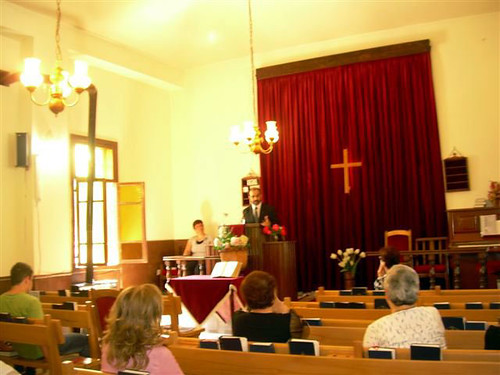
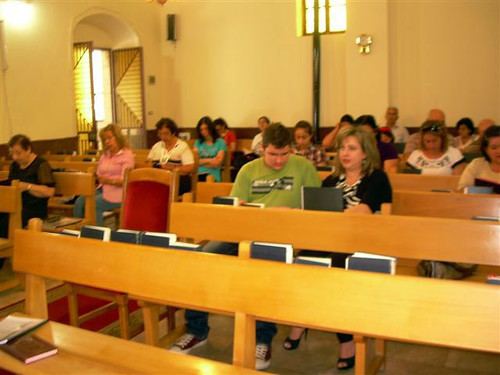
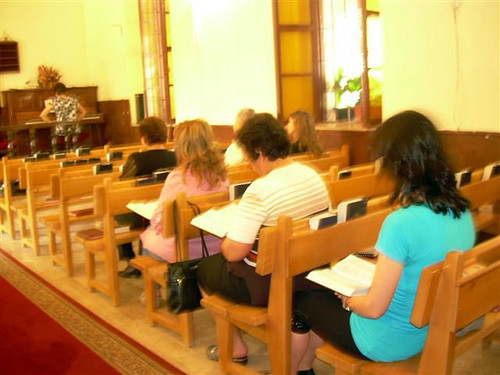
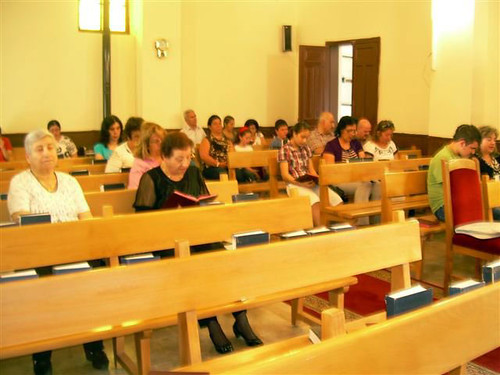
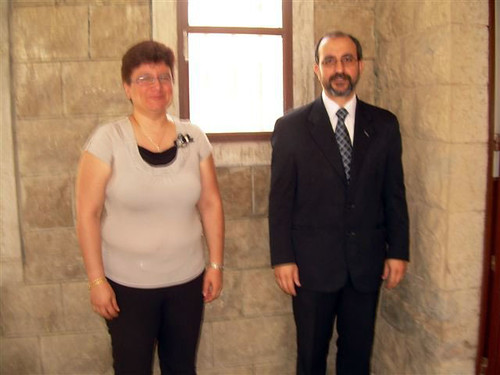
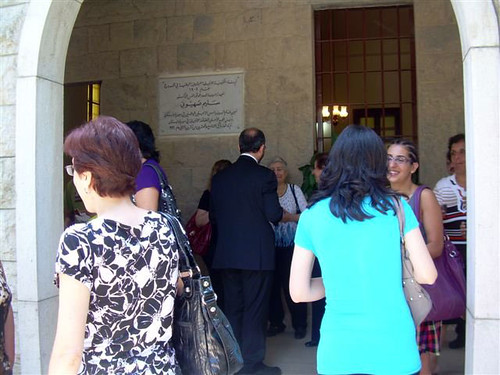
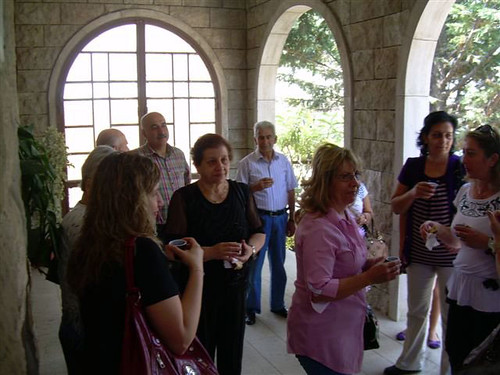







Evangelist Luis Palau Preaches to Crowd in Marseille, France
Argentinian-born evangelist Luis Palau preached in the southeast coastal city of Marseille, France on Saturday, concluding his three-day Christian outreach festival.

(Photo: Luis Palau Evangelistic Association)
Evangelist Luis Palau preaches in Marseille, France on Friday, June 1, 2011.
The Luis Palau festival in Marseille was unique in that on Saturday the message was picked up by a satellite channel with millions of viewers. Palau spoke in Spanish while his interpreter translated his message into French.
Every night the festival, which began June 30, was taped for delayed transmission to Francophone Africa, the Middle East on CAN, and France on Dieu TV. Standing on the beaches of Plage du Prado, Palau preached about the Good News found in Jesus Christ.
The Luis Palau festival is the first event of its kind to be sponsored by the city of Marseille. Like other Palau fest, there were children’s activities, concert-like music, soccer, and preaching.
“We’re so used to having evangelical events and opportunities in [the United States], that we just take it for granted. We’re on the radio, we’re on the TV, in print, and all the things that we normally do which you really can’t do in France,” said Colin James of the Luis Palau Evangelistic Association to MNN.
“The opportunities are very limited and constrained because of the culture and just the way the country has been run. It’s not an evangelical-based country.”
According to the CIA World Factbook, less than 2 percent of France’s population is Protestant Christian.
“Please pray that God will continue to pour our His Spirit in Marseille. Pray that the believers, especially the new ones as a result of this festival, will experience a radical transformation in their lives and live totally for Christ,” read the latest posting for the Marseille festival on the Luis Palau Evangelistic Association website.

(Photo: Luis Palau Evangelistic Association)
Evangelist Luis Palau preaches in Marseille, France on Friday, June 1, 2011.
The Luis Palau festival in Marseille was unique in that on Saturday the message was picked up by a satellite channel with millions of viewers. Palau spoke in Spanish while his interpreter translated his message into French.
Every night the festival, which began June 30, was taped for delayed transmission to Francophone Africa, the Middle East on CAN, and France on Dieu TV. Standing on the beaches of Plage du Prado, Palau preached about the Good News found in Jesus Christ.
The Luis Palau festival is the first event of its kind to be sponsored by the city of Marseille. Like other Palau fest, there were children’s activities, concert-like music, soccer, and preaching.
“We’re so used to having evangelical events and opportunities in [the United States], that we just take it for granted. We’re on the radio, we’re on the TV, in print, and all the things that we normally do which you really can’t do in France,” said Colin James of the Luis Palau Evangelistic Association to MNN.
“The opportunities are very limited and constrained because of the culture and just the way the country has been run. It’s not an evangelical-based country.”
According to the CIA World Factbook, less than 2 percent of France’s population is Protestant Christian.
“Please pray that God will continue to pour our His Spirit in Marseille. Pray that the believers, especially the new ones as a result of this festival, will experience a radical transformation in their lives and live totally for Christ,” read the latest posting for the Marseille festival on the Luis Palau Evangelistic Association website.
iPads replacing note pads as Asian schools go high-tech
Agence France Press

This photo taken on May 18, 2011, shows Singapore students using the iPad in a language arts class in Nanyang Girls' High School. (AFP)
Read more: http://www.dailystar.com.lb/Technology/International/2011/Jun-05/iPads-replacing-note-pads-as-Asian-schools-go-high-tech.ashx#ixzz1OUr0T98W
(The Daily Star :: Lebanon News :: http://www.dailystar.com.lb)
SINGAPORE: Apple’s iPad and other tablet computers are replacing traditional note pads in some Asian schools and making the lives of thousands of students a lot easier.
Soon pupils could be reading on their tablets about a quaint old communication device called “paper,” especially in Asia’s advanced economies where many schools are racing toward a paperless classroom.
The slim glass slabs slip easily into a bag and can store thousands of textbooks, making a fat school bag full of heavy books, pens and notepads a thing of the past.
“I like the iPad because it is portable and we do not have to carry so many bags and files around,” said 13-year-old Nicole Ong, who now makes notes on her iPad during class at Nanyang Girls’ High School in Singapore.
A sample group of more than 120 students and 16 teachers at the school have been given iPads, at a cost of over $100,000. By 2013, every student in the school will have one.
The number of software applications – or apps – that can be used for educational purposes on tablet computers is set to explode.
It’s a brand new business that even media mogul Rupert Murdoch has identified as an area of huge potential growth.
Murdoch said his News Corp group is to push into the education technology market in a speech to the e-G8 conference of Internet entrepreneurs and European policymakers in Paris last month.
He described education as the “last holdout from the digital revolution” and outlined a vision for personalized learning with lessons delivered by the world’s best teachers to thousands of students via the Internet.
“Today’s classroom looks almost exactly the same as it did in the Victorian age,” Murdoch added.
But many Asian schools are already way ahead of the game.
“No longer is language learning solely based on the teacher commenting on students’ works – classmates can feedback on one another,” said Seah Hui Yong, curriculum dean of Nanyang.
Rene Yeo, head of the information technology department at Tampines Secondary School, also in Singapore, teaches science with his iPad. His students learn factorization by simply moving the numbers around on the screen.
They also read about animal cells and the human brain structure by clicking on the various parts. And tablet computers make the double helix structure of a human DNA practically come to life before a student’s eyes.
There are apps to learn English and maths, pupils can do cause and effect analysis on iBrainstorm, prepare for oral exams and speeches with AudioNote and even strum the guitar for a music lesson on GarageBand.
The rise of classroom technology will mirror its rise throughout society, says Sam Han, a US-based expert on the role of technology in education.
Han, instructional technology fellow at the Macaulay Honors College, City University of New York, said he expects some Asian countries to leapfrog the West.
“While the Internet was birthed in the US, Singapore and South Korea [for example) boast far greater broadband Internet access penetration and infrastructure than the US,” he said.
Japan’s communications ministry has given tablets to more than 3,000 under-12 pupils at 10 elementary schools and even fitted classrooms with interactive electronic blackboards under the so-called “future school” pilot project.
In South Korea, where schools have WiFi zones, the education ministry has been testing “digital textbooks” in some schools since 2007. In 2012, the ministry says it will decide whether to supply tablets to schools nationwide.
Singapore has a hugely competitive education system known for its high level of science and mathematics instruction. The education ministry provides a grant for schools to buy this kind of equipment, as well as software and services.
Many schools already have WiFi, making it easy for students to connect to the Internet.
But some teachers acknowledged there are students who get distracted by playing games or surfing Facebook and other social media sites like Twitter.
Education psychologist Qiu Lin cautioned against schools getting carried away and promoting the blind use of technological devices, and neglecting the real goals of education.
“The trend of integrating technology into education will definitely increase,” said the assistant professor at Nanyang Technological University, which is separate from the high school.
“But after one month when the novelty of iPads wears down, a good curriculum and teaching materials that can increase deep thinking and problem solving in students need to be in place.”

This photo taken on May 18, 2011, shows Singapore students using the iPad in a language arts class in Nanyang Girls' High School. (AFP)
Read more: http://www.dailystar.com.lb/Technology/International/2011/Jun-05/iPads-replacing-note-pads-as-Asian-schools-go-high-tech.ashx#ixzz1OUr0T98W
(The Daily Star :: Lebanon News :: http://www.dailystar.com.lb)
SINGAPORE: Apple’s iPad and other tablet computers are replacing traditional note pads in some Asian schools and making the lives of thousands of students a lot easier.
Soon pupils could be reading on their tablets about a quaint old communication device called “paper,” especially in Asia’s advanced economies where many schools are racing toward a paperless classroom.
The slim glass slabs slip easily into a bag and can store thousands of textbooks, making a fat school bag full of heavy books, pens and notepads a thing of the past.
“I like the iPad because it is portable and we do not have to carry so many bags and files around,” said 13-year-old Nicole Ong, who now makes notes on her iPad during class at Nanyang Girls’ High School in Singapore.
A sample group of more than 120 students and 16 teachers at the school have been given iPads, at a cost of over $100,000. By 2013, every student in the school will have one.
The number of software applications – or apps – that can be used for educational purposes on tablet computers is set to explode.
It’s a brand new business that even media mogul Rupert Murdoch has identified as an area of huge potential growth.
Murdoch said his News Corp group is to push into the education technology market in a speech to the e-G8 conference of Internet entrepreneurs and European policymakers in Paris last month.
He described education as the “last holdout from the digital revolution” and outlined a vision for personalized learning with lessons delivered by the world’s best teachers to thousands of students via the Internet.
“Today’s classroom looks almost exactly the same as it did in the Victorian age,” Murdoch added.
But many Asian schools are already way ahead of the game.
“No longer is language learning solely based on the teacher commenting on students’ works – classmates can feedback on one another,” said Seah Hui Yong, curriculum dean of Nanyang.
Rene Yeo, head of the information technology department at Tampines Secondary School, also in Singapore, teaches science with his iPad. His students learn factorization by simply moving the numbers around on the screen.
They also read about animal cells and the human brain structure by clicking on the various parts. And tablet computers make the double helix structure of a human DNA practically come to life before a student’s eyes.
There are apps to learn English and maths, pupils can do cause and effect analysis on iBrainstorm, prepare for oral exams and speeches with AudioNote and even strum the guitar for a music lesson on GarageBand.
The rise of classroom technology will mirror its rise throughout society, says Sam Han, a US-based expert on the role of technology in education.
Han, instructional technology fellow at the Macaulay Honors College, City University of New York, said he expects some Asian countries to leapfrog the West.
“While the Internet was birthed in the US, Singapore and South Korea [for example) boast far greater broadband Internet access penetration and infrastructure than the US,” he said.
Japan’s communications ministry has given tablets to more than 3,000 under-12 pupils at 10 elementary schools and even fitted classrooms with interactive electronic blackboards under the so-called “future school” pilot project.
In South Korea, where schools have WiFi zones, the education ministry has been testing “digital textbooks” in some schools since 2007. In 2012, the ministry says it will decide whether to supply tablets to schools nationwide.
Singapore has a hugely competitive education system known for its high level of science and mathematics instruction. The education ministry provides a grant for schools to buy this kind of equipment, as well as software and services.
Many schools already have WiFi, making it easy for students to connect to the Internet.
But some teachers acknowledged there are students who get distracted by playing games or surfing Facebook and other social media sites like Twitter.
Education psychologist Qiu Lin cautioned against schools getting carried away and promoting the blind use of technological devices, and neglecting the real goals of education.
“The trend of integrating technology into education will definitely increase,” said the assistant professor at Nanyang Technological University, which is separate from the high school.
“But after one month when the novelty of iPads wears down, a good curriculum and teaching materials that can increase deep thinking and problem solving in students need to be in place.”
Haigazian University’s 51st Commencement Exercises
On Friday, July 1st 2011, Haigazian University proudly graduated 150 students in the First Armenian Evangelical Church courtyard in Beirut.
 The ceremony honored 150 students from the faculties of Business Administration and Economics, Humanities, Sciences and Social and Behavioral Sciences with the BA and BS degrees, including 14 students with the Masters degrees in the faculties of Business Administration and Economics and Social and Behavioral Sciences.
The ceremony honored 150 students from the faculties of Business Administration and Economics, Humanities, Sciences and Social and Behavioral Sciences with the BA and BS degrees, including 14 students with the Masters degrees in the faculties of Business Administration and Economics and Social and Behavioral Sciences.  The university President Rev. Dr. Paul Haidostian focused his word on the need to find stability and balance in the hectic world we live in. Haidostian noted that this was an important message of the university, as Haigazian University “has directly and indirectly taught that balance is a value we should cherish… It is a critical need of life for good judgment and good quality, and it gives both a deep and a wide perspective in life” Haidostian concluded by saying “balance in ones views requires a standpoint, but a standpoint is not only a point. It is a point which helps you stand: today, alone, with others, and tomorrow, in all circumstances.”
The university President Rev. Dr. Paul Haidostian focused his word on the need to find stability and balance in the hectic world we live in. Haidostian noted that this was an important message of the university, as Haigazian University “has directly and indirectly taught that balance is a value we should cherish… It is a critical need of life for good judgment and good quality, and it gives both a deep and a wide perspective in life” Haidostian concluded by saying “balance in ones views requires a standpoint, but a standpoint is not only a point. It is a point which helps you stand: today, alone, with others, and tomorrow, in all circumstances.” In her valedictorian address In English, Dima Matta, speaking in English, hailed Haigazian as “a refuge, a haven of scholarship and a shelter of fellowship and camaraderie.” She spoke of the challenge to overcome all obstacles through Haigazian’s motto of “truth, freedom and service.” Rather than settling for “a tomorrow filled with ashes,” Matta urged her fellow graduates to actively “dus
In her valedictorian address In English, Dima Matta, speaking in English, hailed Haigazian as “a refuge, a haven of scholarship and a shelter of fellowship and camaraderie.” She spoke of the challenge to overcome all obstacles through Haigazian’s motto of “truth, freedom and service.” Rather than settling for “a tomorrow filled with ashes,” Matta urged her fellow graduates to actively “dus
 The ceremony honored 150 students from the faculties of Business Administration and Economics, Humanities, Sciences and Social and Behavioral Sciences with the BA and BS degrees, including 14 students with the Masters degrees in the faculties of Business Administration and Economics and Social and Behavioral Sciences.
The ceremony honored 150 students from the faculties of Business Administration and Economics, Humanities, Sciences and Social and Behavioral Sciences with the BA and BS degrees, including 14 students with the Masters degrees in the faculties of Business Administration and Economics and Social and Behavioral Sciences. Government Minister Panos Manjian represented the President of the Republic, the President of the Council of Ministers and the Speaker of the Parliament. Among the attendees were MP Jean Oghasabian, representing former Prime Minister Saad Hariri, MPs. Dr. Basssem Shabb, Serge Toursarkissian, Sebouh Kalpakian, Armenian Ambassador Ashod Kotcharian, US Public Affairs Officer Ryan Gliha, The USAID Director, Dr. Jim Barnhart, in addition to representatives of the Commander of the Army and the chief of Internal Security, the President of the Supreme Council of the Evangelical Community in Syria and Lebanon, Rev. Salim Sahyouni, Archbishop Kegham Khatcherian, former ministers and MPs, diplomats, clergy, members of the Board of Trustees, parents, relatives and friends, all in all more than 1,100 guests.
The ceremony started as the Faculty and Graduates marched through the crowd of parents, relatives and friends to the celebratory processional march “Pomp and Circumstance” by Sir Edward Elgar, followed by the Lebanese National Anthem, and the Invocation by the Campus Minister, Rev. W. Gregory Lee-Parker.
 The university President Rev. Dr. Paul Haidostian focused his word on the need to find stability and balance in the hectic world we live in. Haidostian noted that this was an important message of the university, as Haigazian University “has directly and indirectly taught that balance is a value we should cherish… It is a critical need of life for good judgment and good quality, and it gives both a deep and a wide perspective in life” Haidostian concluded by saying “balance in ones views requires a standpoint, but a standpoint is not only a point. It is a point which helps you stand: today, alone, with others, and tomorrow, in all circumstances.”
The university President Rev. Dr. Paul Haidostian focused his word on the need to find stability and balance in the hectic world we live in. Haidostian noted that this was an important message of the university, as Haigazian University “has directly and indirectly taught that balance is a value we should cherish… It is a critical need of life for good judgment and good quality, and it gives both a deep and a wide perspective in life” Haidostian concluded by saying “balance in ones views requires a standpoint, but a standpoint is not only a point. It is a point which helps you stand: today, alone, with others, and tomorrow, in all circumstances.”The keynote speaker of the ceremony, Michel Goguikian, a successful International Banker and financier of Lebanese - Armenian origins, as well as an avid philanthropist, founder of the Goguikian Foundation, spoke to the Haigazian graduates about his life experiences in South America.
Sharing the important elements that enabled him to succeed, Goguikian stressed the importance of expecting and preparing for adversity and learning to work through it. Moreover, he underscored “the invaluable role of passion” and finding it in all that one does.
Goguikian, who is actively involved in a number of charitable foundations that particularly support higher education, also addressed the importance of giving back to society. “As graduates of one of Lebanon's most prestigious universities, you should not forget your responsibility toward society and moral obligations toward your country,” he concluded.
Following the keynote address, Registrar Anahid Fermanian and Deans Fadi Asrawi and Arda Ekmekji presented the graduates who received their degrees from President Haidostian.
 In her valedictorian address In English, Dima Matta, speaking in English, hailed Haigazian as “a refuge, a haven of scholarship and a shelter of fellowship and camaraderie.” She spoke of the challenge to overcome all obstacles through Haigazian’s motto of “truth, freedom and service.” Rather than settling for “a tomorrow filled with ashes,” Matta urged her fellow graduates to actively “dus
In her valedictorian address In English, Dima Matta, speaking in English, hailed Haigazian as “a refuge, a haven of scholarship and a shelter of fellowship and camaraderie.” She spoke of the challenge to overcome all obstacles through Haigazian’s motto of “truth, freedom and service.” Rather than settling for “a tomorrow filled with ashes,” Matta urged her fellow graduates to actively “dust” the ashes off.
Valedictorian Garo Keurkunian addressed his fellow graduates in Arabic, reflecting on the gifts that Haigazian had given him and all other graduates in preparing them for the life ahead. He expressed his gratitude to Haigazian for providing its students with a most rewarding and well-rounded education, as well as preparing them for the challenges of professional life. Keurkunian concluded with a promise to his country Lebanon, to be faithful and grateful no matter the distances that may separate them.
After singing the Alma Mater, the ceremony ended with the Benediction given by the President of the Union of the Armenian Evangelical Churches in The Near East, Rev. Megrdich Karagoezian.
The class of 2011 threw their caps high into the air as blue and orange balloons flew overhead. The graduates then walked proudly out with the recessional “Trumpet Tune” by Henry
Purcell, eager to move to the Mugar and the New Heritage Building gardens and take memorable pictures with their friends and families to commemorate this special day.
Mira Yardemian
Public Relations Director
Հայ Աւետարանական Փ. Եւ Է. Թորոսեան Միջնկարգ Վարժարանի Ամավերջի Հանդէս
Մային 28-ո Առթիւ Մրցանքներ Հայ Աւետարանական Բեթէլ Երկրդ. Վարժարանէն Ներս
«ՕՏԱՐՆԵՐՈՒ ԿՈՂՄԷ ՄՇԱԿՈՒԱԾ ԵՒ ՀԱՅԵՐՈՒՆ ՆՈՒԻՐՈՒԱԾ ԳԵՂԵՑԻԿ ՊԱՐՏԷԶԻ ՆՄԱՆ Է ԾԵՐԱՆՈՑԸ» Կ՛ԸՍԷ Գ. ԳԱՐԱՊՈՅԱՃԵԱՆ
This is an interesting interview by Aztag, with the principal of the Elders' House and Cahl in Bourj Hammoud. The interview is in Armenian and was published days before the passing away of Mr. Kevork Karaboyajian, a member of the Armenian Evangelical First Church, in Beirut.
He has departed us to be with His Lord, and he has left us with a large legacy.
Have you know Mr. Kevork? Has he shared Christ's odour with you?
Click on the image to read the interview.
He has departed us to be with His Lord, and he has left us with a large legacy.
Have you know Mr. Kevork? Has he shared Christ's odour with you?
Click on the image to read the interview.
Stop disintegration of the family in Europe - pope
Reuters

Pope Benedict XVI makes the sign of the cross as he leads a solemn mass in Zagreb June 5, 2011. The Pope is on a two-day visit to Croatia. (Reuters)
ZAGREB: Pope Benedict warned Sunday that the traditional family in Europe was "disintegrating" under the weight of secularization and called for laws to help couples cope with the costs of having and educating children.
On the second day of his trip to Croatia, a bastion of Roman Catholicism in the Balkans, the pope said in open-air mass for hundreds of thousands of people and hammered home one of the major themes of his papacy.
"Unfortunately, we are forced to acknowledge the spread of a secularization which leads to the exclusion of God from life and the increasing disintegration of the family, especially in Europe," he said in his sermon on the edge of the capital.
The 84-year-old Benedict's sermon was the latest in a series of salvos against what the Church sees as growing anti-Catholicism and "Christianophobia" in Europe.
Speaking on the day Croatia, whose population of 4.4 million people is 90 percent Catholic, celebrates its "Family Day", he railed against practices such abortion, cohabitation as a "substitute for marriage", and artificial birth control.
The pope urged Catholic families throughout Europe not to give in to a creeping "secularized mentality" and called for "legislation which supports families in the task of giving birth to children and educating them".
The sermon reflected the Vatican's belief that the Catholic Church in Europe is under assault by some national governments and European institutions over issues such as gay marriage, abortion, religious education and the use of Christian religious symbols in public places.
Last year the Vatican criticized plans to propose legislation in Britain, known as the Equality Bill, that could force churches to hire homosexuals or transsexuals.
The Vatican was also at the forefront of a campaign that overturned a ruling by the continent's top human rights court that would have banned crucifixes in schools in Italy.
At the start of the trip on Saturday, the pope criticized the European Union, saying its bureaucracy is overly centralized and sometimes neglected historical differences and national cultures.
The Vatican strongly supports Croatia's bid to become an EU member, which it is expected to achieve in 2013. This would put another overwhelmingly Catholic country in the bloc.

Pope Benedict XVI makes the sign of the cross as he leads a solemn mass in Zagreb June 5, 2011. The Pope is on a two-day visit to Croatia. (Reuters)
ZAGREB: Pope Benedict warned Sunday that the traditional family in Europe was "disintegrating" under the weight of secularization and called for laws to help couples cope with the costs of having and educating children.
On the second day of his trip to Croatia, a bastion of Roman Catholicism in the Balkans, the pope said in open-air mass for hundreds of thousands of people and hammered home one of the major themes of his papacy.
"Unfortunately, we are forced to acknowledge the spread of a secularization which leads to the exclusion of God from life and the increasing disintegration of the family, especially in Europe," he said in his sermon on the edge of the capital.
The 84-year-old Benedict's sermon was the latest in a series of salvos against what the Church sees as growing anti-Catholicism and "Christianophobia" in Europe.
Speaking on the day Croatia, whose population of 4.4 million people is 90 percent Catholic, celebrates its "Family Day", he railed against practices such abortion, cohabitation as a "substitute for marriage", and artificial birth control.
The pope urged Catholic families throughout Europe not to give in to a creeping "secularized mentality" and called for "legislation which supports families in the task of giving birth to children and educating them".
The sermon reflected the Vatican's belief that the Catholic Church in Europe is under assault by some national governments and European institutions over issues such as gay marriage, abortion, religious education and the use of Christian religious symbols in public places.
Last year the Vatican criticized plans to propose legislation in Britain, known as the Equality Bill, that could force churches to hire homosexuals or transsexuals.
The Vatican was also at the forefront of a campaign that overturned a ruling by the continent's top human rights court that would have banned crucifixes in schools in Italy.
At the start of the trip on Saturday, the pope criticized the European Union, saying its bureaucracy is overly centralized and sometimes neglected historical differences and national cultures.
The Vatican strongly supports Croatia's bid to become an EU member, which it is expected to achieve in 2013. This would put another overwhelmingly Catholic country in the bloc.
An Interview with Vartoug Balekjian and Ani Baboghlanian, On the Launching of New Worship Services for the Third Year Now, in Mrouj Village
Many decades ago, a lot of Armenians, escaping the humidity in Beirut, used to spend their Summer in the mountain villages, renting houses in villages like Mrouj, Bolognia, Dhour-Shweir, Mtein. During the war, the number of families spending their Summer in the villages have declined. However, recently there is a return to the villages and the number of Armenian families in these villages has been increasing during the Summer. Two ladies, Ms. Vartoug Balekjian and Ms. Ani Baboghlanian, serving members in the Armenian Evangelical Emmanuel Church, had the vision to start Sunday church services in Mrouj during the Summer. In order to receive further information about their initiative, which continues for the third year now, we had an interview with them.
Note: the Summer services in Mrouj will start on Sunday, 10 July 2011 and end on Sunday, 25 September 2011.
(Interview by Raffi)
Note: the Summer services in Mrouj will start on Sunday, 10 July 2011 and end on Sunday, 25 September 2011.
(Interview by Raffi)
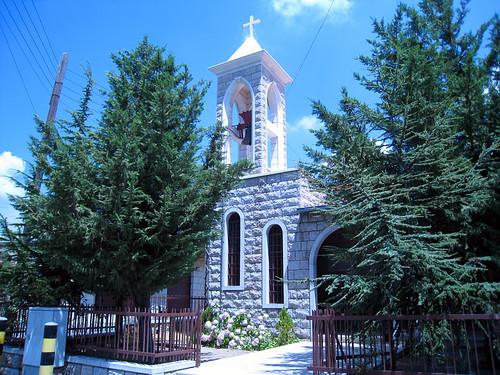
The Arab Evangelical Church in Mrouj, where the Armenian Evangelical Worship services are held during the Summer
Raffi - What is the need that you saw in Mrouj, for which you worked to have church services there?
Vartoug & Ani - Basically, it started in response to a personal need. As you know the village is about 45 minutes from Beirut, and to go down to attend a worship service at our Church meant giving at least three hours of Sunday mornings. So, to go down on a Sunday, proved to be time consuming and on many days simply impossible, because we had to leave behind guests, and most of our guests would like to visit us during the week ends. Of course there is an Evangelical church in Mrouj in itself and some others in nearby villages, but they are not in Armenian.
Raffi - What steps did you take to start implementing this vision?
Vartoug & Ani - The first step was to share the concern among ourselves, we mean those who practically live in Mrouj during the summer months. Then Ani, who is a member of the Church board, raised the issue at one of their meetings. The idea of having worship service was soon adopted by the church board. Then she contacted Mr. Edward Kharrat, an elder in the Mrouj evangelical church and asked for permission to use the church premises for Armenian worship after their service on Sunday morning. After getting the permission, brochures and posters were prepared and the children in our families helped distribute them to the shops and Armenian families to announce the start of the services.
Raffi - Who participates in the Sunday services and how many attend from the Armenian families in Mrouj?
Vartoug & Ani - There are around ten families, members of which attend regularly. Then are some Armenian families from the neighboring villages who attend more or less regularly. An average number of 30 persons attend the services; some days it is far above that number, on others it is far less!
Raffi - What are the difficulties that you faced?
Vartoug & Ani - A major difficulty was music. The local church did not use the piano they had. So, we had to bring an expert to tune it. Then came the difficulty of finding a piano player each Sunday. Another difficulty was task distribution. There were times when one person carried the whole burden – except that of preaching.
Raffi - How do you see the response of the Armenian Evangelical churches and the Arab Evangelical church to this initiative?
Vartoug & Ani - The local church was more than happy to lend the church hall for Armenian Evangelical worship service. As for the response of the Armenian Evangelical Churches – no direct comments reached us, but all those- and by those we mean pastors and lay people alike- who were approached and asked to lead a service, or preach , or play the piano from different Armenian Evangelical churches, were positive and eager to respond. We are thankful for them all.
Raffi - What are the long term plans?
Vartoug & Ani - The big vision. Well, how big do you want us to make our vision? We would like to see the Armenian Evangelical church, that is half-built in Mrouj, to be completed, so that full church activities could be carried on there in summers; like Sunday school, ladies’ meetings, junior & youth meetings, Bible studies and prayer meetings. A closer vision would be to see more people who live in Mrouj in summers attend these services.

The Armenian Evangelical Church in Mrouj, which was left half-built after the war started in the 70s.



















